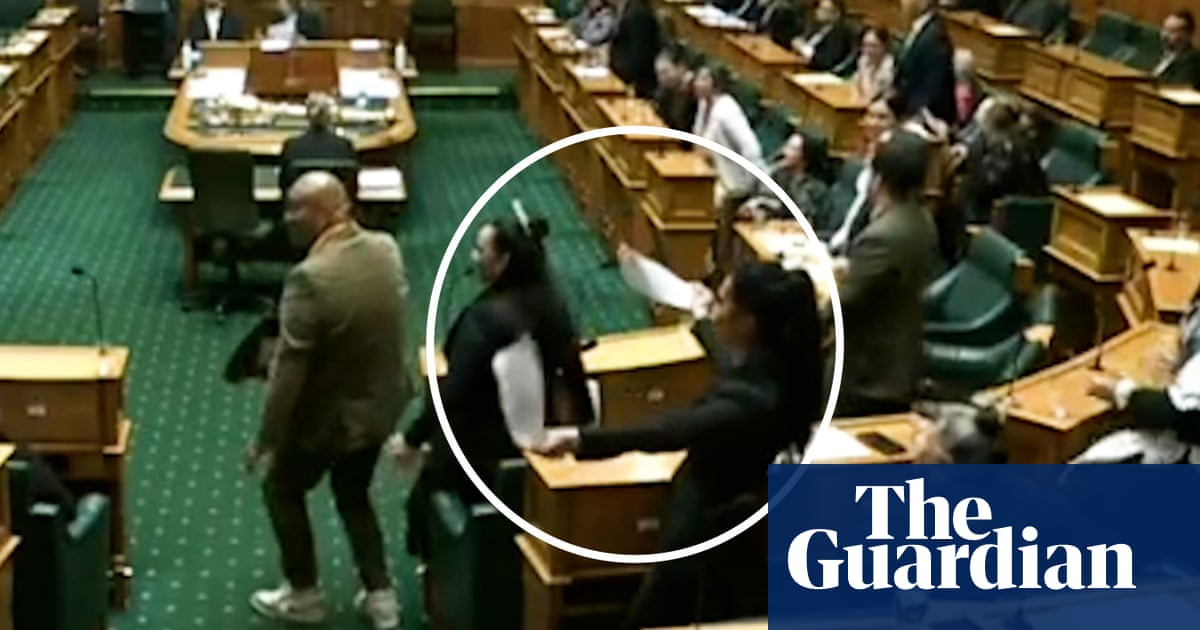ThreeNew ZealandMPs who performed a haka in parliament will be temporarily suspended, in what is believed to be the harshest ever penalty issued to parliamentarians.
The co-leaders of Te Pāti Māori (the Māori Party) Debbie Ngarewa-Packer and Rawiri Waititi, and the party’s youngest member, Hana-Rawhiti Maipi-Clarke, performed the traditional Māori dance during a vote on the controversialTreaty Principles Billduring its first reading in November.
Thevideo of the haka, which included Maipi-Clarke ripping up a copy of the bill, rapidly spread around the globe, clocking up hundreds of millions of views.The treaty principles bill sought to radically reinterpret theTreaty of Waitangi, New Zealand’s founding document between Māori tribes and the British Crown, which was signed in 1840 and is instrumental in upholding Māori rights. The proposal – introduced by the coalition’s minor libertarian Act Party – promptedwidespread alarmover its potential to wind back decades of progress for Māori people, sparking off thelargest ever protest over Māori rights.
It wasultimately defeated at its second readingin April.
But in a report released on Wednesday, theprivileges committee recommendedsuspending Ngarewa-Packer and Waititi for three weeks – an unprecedented penalty – and Maipi-Clarke for seven days, saying the trio’s actions could have intimidated other legislators and were in contempt of parliament.
Haka have been performed in parliament in the past, including by Waititi, but the committee said the manner and timing of this haka, which interrupted other members’ ability to vote on the bill, was “a serious matter”.
“We acknowledge the severity of the penalties proposed … however, we intend to leave members in no doubt that the behaviour discussed is not acceptable and that the intimidation of other members of the house is treated with utmost seriousness,” the report said.
The report said it was unacceptable for Ngarewa-Packer to appear to simulate a firing a gun at another member of parliament with her hand. Ngarewa-Packer rejected this interpretation, saying the motion was a “wiri” – an expression rooted in haka andMāorioratory.
Judith Collins, the attorney-general and committee chair, said it was the toughest punishment the committee had ever handed out and “the worst incident that we have ever seen”.“Make no mistake. This was a very serious incident, the likes of which I have never seen before in my 23 years in the debating chamber,” she said.
The temporary suspensions are expected to be affirmed by vote during a sitting of all lawmakers on Tuesday. The three MPs will not receive their salaries during the suspension and will not be present during next week’s annual budget debate.
In a statement on social media, Te Pāti Māori condemned the suspensions as being “the worst punishment handed down ever”.
“When tangata whenua [people of the land] resist, colonial powers reach for maximum penalty. This is a warning shot to all of us to fall in line,” the party said.
The opposition Labour party agreed the MPs conduct constituted a contempt of the house but felt the penalties were “unduly severe”, believing a suspension of one to two days would be appropriate.
The Green party opposed the suspensions, saying they were “completely out of proportion” to the breach and expressed concern Te Pāti Māori voters would not be represented in the house for the budget.
The report included statements from the three MPs, who argued the haka was justified.
“In a space debating our rights and interests as tangata whenua, haka was the only way to respond for the hundreds of thousands of our people being harmed,” Ngarewa Packer said.
